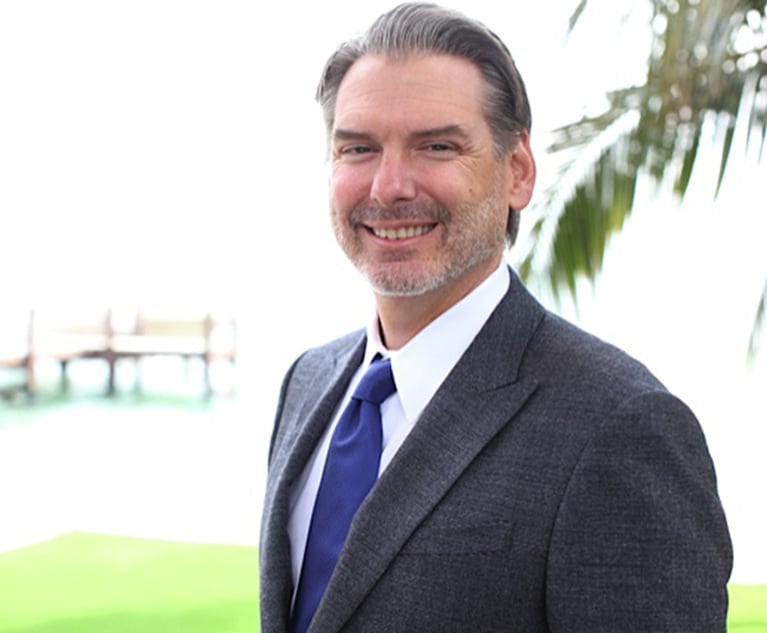Alan Dershowitz's Argument for Lowering the Age of Consent Leaves Some Lawyers 'Rightly Troubled'
Retired Harvard University law professor Alan Dershowitz, implicated by two women in financier Jeffrey Epstein's national sex scandal, is under fire for a 1997 op-ed that laid out a legal argument linking abortion and the age of consent.
August 01, 2019 at 01:37 PM
7 minute read
 Legal scholar and former Harvard law professor Alan Dershowitz defended an old op-ed about the age of consent on Twitter, sparking an instant backlash. Courtesy photo.
Legal scholar and former Harvard law professor Alan Dershowitz defended an old op-ed about the age of consent on Twitter, sparking an instant backlash. Courtesy photo.
Retired Harvard law professor Alan M. Dershowitz’s decision to defend an old column about the legal argument for lowering the age of consent has reignited an uproar within the legal community against the famed attorney.
Now seen through the lens of the #MeToo movement and Dershowitz’s own national scandal involving convicted sex offender Jeffrey Epstein, the decades-old article caused a firestorm on social media, where the hashtag #CreepyDershowitz trended amid widespread backlash.
Now, some attorneys and fellow law professors are saying Dershowitz’s argument appears to support adults having sex with minors.
But Dershowitz said the controversy is just the latest example of people being afraid to challenge public opinion on sensitive topics—a sentiment echoed by others criticizing the reactive nature of Twitter. He also maintained he was making a legal argument—not a moral one—in the opinion piece he wrote in 1997 for the Los Angeles Times.
“Alan’s genius as a teacher has always been his ability to present interesting and challenging legal questions,” said Fort Lauderdale attorney Bruce Rogow, a lawyer for more than 50 years and specialist in constitutional law. ”That aptitude and facility is what makes him unique. Whether one agrees or disagrees is not the point. The point is that provoking discussion on any serious subject has great value.”
But whatever value the exercise might have had now seems a distant second to the whirlwind engulfing the ex-professor, whose article, “Statutory Rape is an Outdated Concept,” resurfaced Monday in the New Yorker.
“Why is Alan Dershowitz trying to lower the age of consent in this op-ed?” University of Minnesota law professor Richard W. Painter tweeted.
Dershowitz responded by arguing that the issue presented a “constitutional conundrum worth discussion.” The question he raises is this: If a 16-year-old is able to independently decide to have an abortion, then should she also be deemed legally competent to have sex?
I stand by the constitutional (not moral) argument I offered in my controversial oped: if a 16 year old has the constitutional right to have an abortion without state or parental interference, how could she not have the constitutional right to engage in consensual sex? 1/ https://t.co/48Thb8Uaym
— Alan Dershowitz (@AlanDersh) July 29, 2019
‘People are terrified’
The article has reemerged at a bad time for Dershowitz, who’s facing accusations from two women who claim they were forced to have sex with him at the direction of Epstein, a financier who has homes in Manhattan and South Florida. Dershowitz says the allegations are false and has frequently claimed to have proof of his innocence.
But now, his own words have come back to haunt him.
The 1997 op-ed stemmed from a conversation with a college student, according to Dershowitz, who sought pro bono help after the parents of his 16-year-old girlfriend brought charges against him. Dershowitz said he recommended the student’s attorney make a constitutional argument. He said he then wrote the article to spark a debate.
“I was always regarded as the most controversial and most exciting and the most accessible professor. People lined up to my classes,” Dershowitz said. “I think law teaching is going to become a lot more boring if professors are afraid to provoke controversy in the classroom.”
Some of Dershowitz’s most provocative pieces were about torture, capital punishment, Israel and commitment of the mentally ill. He said that only about 1% or 2% of his writing has been about rape or sex.
In Dershowitz’s view, the backlash demonstrates that people have good reason to be fearful of wading into debates about highly charged topics.
“People not only should be afraid, they are afraid,” Dershowitz said. “People are terrified today of making any argument that is deemed politically incorrect to the #MeToo movement. It’s become a moral sin even to defend yourself against the false charge. But I’m going to continue to defend myself and I’m going to continue to accuse my false accusers of being perjurers and liars, because they are.”
But Twitter users were bold, and some suggested he’d made a flawed parallel between abortion and underage sex.
Rightly troubling?
University of Miami professor of law Mary Anne Franks concedes there is a discussion to be had about reexamining the age of consent. But she finds it hard to separate the man from the argument, particularly because Dershowitz has “put his life on blast for pretty much his entire career.”
Franks attended Harvard University, specializes in criminal law, cyber law and the First Amendment, and drafted the first model criminal statute on nonconsensual pornography, or revenge porn. In her view, the op-ed wasn’t just making an abstract legal argument.
“One of the examples that [Dershowitz] uses is of Michael Kennedy, who was in his 30s when he allegedly started having an affair with his children’s babysitter,” Franks said. “So we’re not talking about, really, the right of teenagers to have sex with other teenagers, which is one kind of issue and may be worth asking ourselves whether we’ve drawn the line carefully enough. … Because he put it in the context he did, people are rightly troubled by it.”
Statutory rape laws can be problematic, according to Franks, but she said people are often afraid to consider changing them, because it seemingly threatens to allow adults to have sex with much younger partners who are still children.
Dershowitz, though, has argued for “Romeo and Juliet laws,” which are selective in their application of statutory rape—treating 19-year-old offenders, for example, differently than those in their 30s or 40s.
While Franks welcomed a debate, she, like some of Dershowitz’s Twitter critics, cautioned against conflating abortion with statutory rape laws.
“The right to abortion is the right to bodily autonomy,” Franks said. “Statutory rape laws are not trying, necessarily, to inhibit the minor’s choices, at that point. This is not a question of whether or not she has the right to do with her body what she wishes. It’s about whether or not a 35-year-old has the right to do with his body what he wishes, with a 15-year-old girl.”
Pen versus internet
New York white-collar criminal defense lawyer Randy Zelin has almost 30 years of experience. As he sees it, Dershowitz’s scandal is a “cautionary tale about the power of the pen and the power of the internet,” where nothing is too old to resurface.
“I understand the argument legally,” Zelin said. “The age … to abort a pregnancy should be consistent with the age of consent to have sex. However, the drinking age is not tied to the enlistment in the military age.”
University of Miami law professor Ricardo J. Bascuas, who specializes in criminal law, pointed out that Dershowitz’ s article didn’t advocate for the age of consent to be changed. The problem, in his view, was that Twitter is too reductive a place for such a technical debate.
“His op-ed does not really say that this should be done, only that it would be inconsistent to honor one decision and not the other,” Bascuas said. “One could agree or disagree with that, of course, but you would have to do research to figure out whether competence should be measured using the same criteria in both situations. Twitter, of course, is a terrible forum for such a nuanced and technical discussion.”
This content has been archived. It is available through our partners, LexisNexis® and Bloomberg Law.
To view this content, please continue to their sites.
Not a Lexis Subscriber?
Subscribe Now
Not a Bloomberg Law Subscriber?
Subscribe Now
NOT FOR REPRINT
© 2025 ALM Global, LLC, All Rights Reserved. Request academic re-use from www.copyright.com. All other uses, submit a request to [email protected]. For more information visit Asset & Logo Licensing.
You Might Like
View All
Meta agrees to pay $25 million to settle lawsuit from Trump after Jan. 6 suspension
4 minute read
Executive Assistant, Alleging Pregnancy Discrimination and Retaliation, Sues Florida Healthcare Entrepreneur
3 minute read
Trending Stories
- 1Fresh lawsuit hits Oregon city at the heart of Supreme Court ruling on homeless encampments
- 2Ex-Kline & Specter Associate Drops Lawsuit Against the Firm
- 3Am Law 100 Lateral Partner Hiring Rose in 2024: Report
- 4The Importance of Federal Rule of Evidence 502 and Its Impact on Privilege
- 5What’s at Stake in Supreme Court Case Over Religious Charter School?
Who Got The Work
J. Brugh Lower of Gibbons has entered an appearance for industrial equipment supplier Devco Corporation in a pending trademark infringement lawsuit. The suit, accusing the defendant of selling knock-off Graco products, was filed Dec. 18 in New Jersey District Court by Rivkin Radler on behalf of Graco Inc. and Graco Minnesota. The case, assigned to U.S. District Judge Zahid N. Quraishi, is 3:24-cv-11294, Graco Inc. et al v. Devco Corporation.
Who Got The Work
Rebecca Maller-Stein and Kent A. Yalowitz of Arnold & Porter Kaye Scholer have entered their appearances for Hanaco Venture Capital and its executives, Lior Prosor and David Frankel, in a pending securities lawsuit. The action, filed on Dec. 24 in New York Southern District Court by Zell, Aron & Co. on behalf of Goldeneye Advisors, accuses the defendants of negligently and fraudulently managing the plaintiff's $1 million investment. The case, assigned to U.S. District Judge Vernon S. Broderick, is 1:24-cv-09918, Goldeneye Advisors, LLC v. Hanaco Venture Capital, Ltd. et al.
Who Got The Work
Attorneys from A&O Shearman has stepped in as defense counsel for Toronto-Dominion Bank and other defendants in a pending securities class action. The suit, filed Dec. 11 in New York Southern District Court by Bleichmar Fonti & Auld, accuses the defendants of concealing the bank's 'pervasive' deficiencies in regards to its compliance with the Bank Secrecy Act and the quality of its anti-money laundering controls. The case, assigned to U.S. District Judge Arun Subramanian, is 1:24-cv-09445, Gonzalez v. The Toronto-Dominion Bank et al.
Who Got The Work
Crown Castle International, a Pennsylvania company providing shared communications infrastructure, has turned to Luke D. Wolf of Gordon Rees Scully Mansukhani to fend off a pending breach-of-contract lawsuit. The court action, filed Nov. 25 in Michigan Eastern District Court by Hooper Hathaway PC on behalf of The Town Residences LLC, accuses Crown Castle of failing to transfer approximately $30,000 in utility payments from T-Mobile in breach of a roof-top lease and assignment agreement. The case, assigned to U.S. District Judge Susan K. Declercq, is 2:24-cv-13131, The Town Residences LLC v. T-Mobile US, Inc. et al.
Who Got The Work
Wilfred P. Coronato and Daniel M. Schwartz of McCarter & English have stepped in as defense counsel to Electrolux Home Products Inc. in a pending product liability lawsuit. The court action, filed Nov. 26 in New York Eastern District Court by Poulos Lopiccolo PC and Nagel Rice LLP on behalf of David Stern, alleges that the defendant's refrigerators’ drawers and shelving repeatedly break and fall apart within months after purchase. The case, assigned to U.S. District Judge Joan M. Azrack, is 2:24-cv-08204, Stern v. Electrolux Home Products, Inc.
Featured Firms
Law Offices of Gary Martin Hays & Associates, P.C.
(470) 294-1674
Law Offices of Mark E. Salomone
(857) 444-6468
Smith & Hassler
(713) 739-1250







